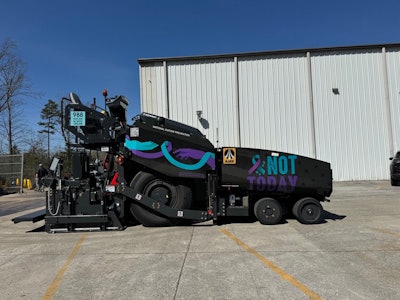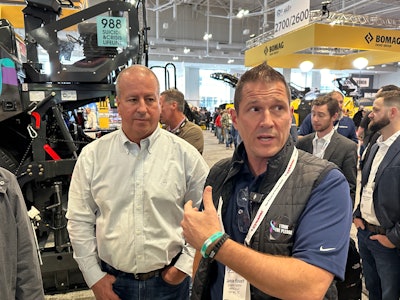
Dynapac has joined in the effort to shine a brighter light on the issue of mental health challenges and suicide within the construction industry.
The company was one of the first manufacturers to sign the Suicide in Construction Awareness Proclamation spearheaded by Dr. Vince Hafeli, president of Ajax Paving Industries of Florida. He has taken the lead in a national campaign promoting awareness of suicide and mental health wellness in the construction industry.
Combined, Dynapac and Hafeli used World of Asphalt 2024 as an opportunity to shine some light on the topic.
Read more here: Construction's Silent Killer.
Hafeli recalled that when he first met Dynapac’s president and general manager, Jamie Rous, it only took about five minutes to know the company was on board with supporting his efforts.
According to Hafeli, one of the first things Roush said was, “Look, I know you don't use much of our equipment and this is not about me trying to sell you anything, but I really want to do this.”
Since that meeting in December 2022, Hafeli has spoken to construction companies and manufacturers (including Dynapac) around the country, collecting signatures for the pledge.
“Supporting suicide prevention efforts in the construction industry isn’t just about saving lives; it’s about recognizing the inherent dignity and value of every individual within our workforce,” Roush said. “By fostering a customer of empathy, support, and understanding, we not only protect the mental health and well-being of our workers but also strengthen the foundation upon which our industry thrives.”
Nearly a year after that first meeting, in November 2023, Roush showed Hafeli a rendering of a specially wrapped D30W paver that Dynapac was planning on presenting at World of Asphalt 2024.
“He didn't ask if we would buy it or contribute, they wanted to do it because they stood behind what I was doing,” Hafeli said. “I looked at him and said, if y'all can do that we'll buy it.”
Dynapac arranged a demo with Ajax Paving and the company was very happy with the machine and set-up to buy the unit with the special suicide awareness wrap.
“My hope is that this will grow and that there will be a lot of awareness raised,” he said. “The awareness isn't about Ajax, it's not about Dynapac, the awareness is to get people to talk.”
The wrap on the D30W highway paver highlights the issue of suicide in the workforce and promotes the 988-crisis hotline.
At World of Asphalt 2024, the company displayed the paver to assist in bringing awareness to the issue of construction workers navigating mental health challenges.
In addition, Dynapac also raised funds for the cause with an interactive experience at their booth that allowed attendees to take the #NotToday pledge by having their photo taken by the paver.
 Combined, Dynapac president and general manager Jamie Roush, at right, and Dr. Vince Hafeli, president of Ajax Paving Industries of Florida, utilized World of Asphalt 2024 as an opportunity to shine some light on the topic suicide within the construction industry.Equipment World
Combined, Dynapac president and general manager Jamie Roush, at right, and Dr. Vince Hafeli, president of Ajax Paving Industries of Florida, utilized World of Asphalt 2024 as an opportunity to shine some light on the topic suicide within the construction industry.Equipment World
“At every one of those places there's someone that wants to share their story and share their struggles,” he said.
The stories have always been there, but most companies did not make it OK to talk about it. As employees learn how the issue is being addressed, more people come forward.
Admittedly, for Hafeli, the cause is very personal. However, while he has his own story, his ultimate effort is to ensure others have a safe place to share their stories and not end up dying by suicide.
Construction workers are among those most at risk of dying by suicide. Statistically speaking, five times more construction workers — more than 5,000 — die by suicide annually than from OSHA's fatal four jobsite accidents.
As if the broader number is not shocking enough, Hafeli noted that two to three construction workers die from injuries on the job daily. Comparatively, 10 to 15 construction workers die by suicide that same day.
“We lose a construction worker about every 1.5 to 2 hours,” he said. Despite those numbers, neither those losses nor the underlying issues of mental health and suicide are often addressed.
Hafeli recalled a few years ago when Ajax Paving lost a worker who was hit by a drunk driver while working on a highway project. Law enforcement and OSHA came to investigate the incident and assisted in reaching out to the family and there was even some local press coverage.
Just a year earlier, the company had lost an employee to suicide. There was no OSHA investigation, no press coverage, and generally, Hafeli felt as though the incident was swept under the rug and people just didn’t talk about it openly.
That approach is not unusual. Last year, it was national or even international news when six construction workers were killed in Maryland when a car crashed into a work zone along I-695.
“That same day we lost twice as many to suicide and not one of their names made the news,” Hafeli said. “People don't know about it.”
While conducting research on the topic of suicide in construction for his doctorate, Hafeli interviewed several construction industry executives across the country. He said there was only one thing they all agreed upon: To truly make any change, leaders in the companies that say they are going to do something have to stand behind and support any initiatives.
“Those stories were always there, we just didn't know because we didn't tell people that they were in a safe place where they could talk about it and share," Hafeli said. Once it is clear there won't be any bullying, repercussions, or termination, the stories come out.
"I'm not saying we have to hand out ice cream cones to our guys on their lunch breaks," he said. "It's a tough industry, it's a demanding industry and it always will be. What I'm saying is that we must treat our workers with a little humanity and compassion the men in my generation didn't.
Hafeli said unlike in the past, companies cannot be led with a stick.
“We still have to discipline employees, we may have to terminate employees because it may not be the right industry for them,” he said. “We must coach employees and there will be times when maybe we do yell at them. I just want our industry to turn into an industry that the younger generation wants to be part of because that's important to them.”
The paving company CEO noted that right now the younger generation has an industry choice.
"They don't have to choose construction, but we want them to choose construction because we're going to become the industry that does lead with some humanity and compassion that doesn't allow bullying and things to take place," he said.











